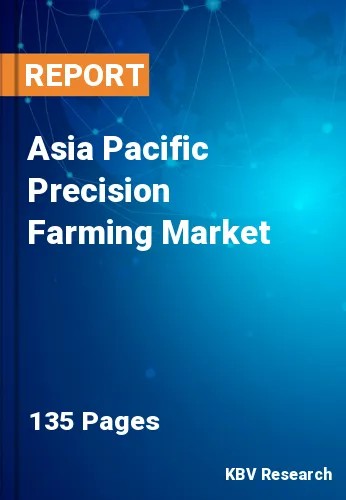The Asia Pacific Precision Farming Market would witness market growth of 7.9% CAGR during the forecast period (2021-2027).
Many technologies like IoT, GPS, and remote sensing application control are employed to gain a thorough grasp of various farming features such as irrigation and ploughing. Farmers can use the Internet of Things (IoT) to help them overcome various crop monitoring challenges. It uses agricultural sensors to provide real-time data on the environmental temperature and soil water content, allowing farmers to make better decisions about harvesting times, crop market rates, and soil management.
Crop production is limited by a number of factors, including the depletion of natural resources and environmental degradation. As environmental concerns develop, farmers are changing their emphasis to sustainable agriculture practices like natural resource preservation. This has increased the demand for improved crop nutrition and protection, which has boosted the precision farming business. Vertical farms with smart designs to increase harvests and prevent waste, for example, have helped the market to grow further.
In emerging nations like India, Sri Lanka, and others, numerous government projects are underway to stimulate the adoption of sophisticated precision farming methods, hence increasing production. In September 2017, China and Israel inked a $300 million trade agreement to boost the sale of environmentally friendly Israeli technologies to China. In addition, Farmers can also get appropriate knowledge about the proper usage and maintenance of precision agricultural equipment thanks to an effective administrative structure.
Due to strong economic growth and continued development in the agriculture sector, Asia-Pacific would be a promising market for global players, driving companies to invest extensively in the precision farming market to sustain growth and enhance productivity. Moreover, factors such as the big shift toward digital transformation, the rise in cloud deployment, technical improvement among farming operations, and the ongoing modernization of the agriculture sector fuel considerable investment in emerging countries.
The China market dominated the Asia Pacific Precision Farming Market by Country in 2020, and would continue to be a dominant market till 2027; thereby, achieving a market value of $800.6 million by 2027. The Japan market is anticipated to grow at a CAGR of 7.2% during (2021 - 2027). Additionally, The India market would experience a CAGR of 8.5% during (2021 - 2027).
Based on Technology, the market is segmented into Guidance Technology, Remote Sensing Technology, Variable Rate Technology. Based on Offering, the market is segmented into Hardware (Automation & Control Systems and Sensing & Monitoring Devices), Software (Local/Web-based and Cloud-based), and Services. Based on Application, the market is segmented into Yield Monitoring, Field Mapping, Weather Tracking & Forecasting, Variable Rate Application, Crop Scouting, Inventory Management, Farm Labour Management, Financial Management and Others. Based on countries, the market is segmented into China, Japan, India, South Korea, Singapore, Malaysia, and Rest of Asia Pacific.
Free Valuable Insights: The Worldwide Precision Farming Market is Projected to reach USD 11.1 Billion by 2027, at a CAGR of 7%
The market research report covers the analysis of key stake holders of the market. Key companies profiled in the report include Trimble, Inc., CNH Industrial N.V., AgEagle Aerial Systems, Inc., Topcon Corporation (Topcon Positioning Systems, Inc.), Hexagon AB (Hexagon Agriculture), CropX, Inc., CropIn Technology Solutions Private Limited, Telus International, Inc., Deere & Company, and AGCO Corporation.
By Technology
By Offering
By Application
By Country
Our team of dedicated experts can provide you with attractive expansion opportunities for your business.

